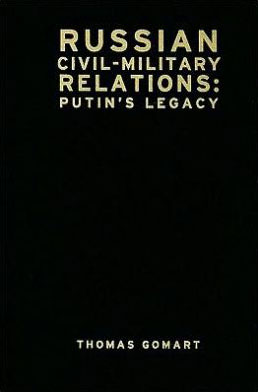Source: Washington
 As Russia reasserts itself on the international stage, the relationship between its civilian and military spheres remains one of the determining factors in the organization of political power. Thomas Gomart’s Russian Civil-Military Relations: Putin’s Legacy looks beyond traditional dualism between the Kremlin and the military, introducing the role of the security services in Russian power distribution. With the support of the siloviki and justification through the fight against “international terrorism,” Putin worked throughout his administration to reestablish presidential control over the military. As Russia transitions to Dmitry Medvedev’s presidency, it is important to review the Putin presidency, which has given many of the country’s institutions their shape, but also reach back further into postcommunist and Soviet history for an understanding of the realities of today.
As Russia reasserts itself on the international stage, the relationship between its civilian and military spheres remains one of the determining factors in the organization of political power. Thomas Gomart’s Russian Civil-Military Relations: Putin’s Legacy looks beyond traditional dualism between the Kremlin and the military, introducing the role of the security services in Russian power distribution. With the support of the siloviki and justification through the fight against “international terrorism,” Putin worked throughout his administration to reestablish presidential control over the military. As Russia transitions to Dmitry Medvedev’s presidency, it is important to review the Putin presidency, which has given many of the country’s institutions their shape, but also reach back further into postcommunist and Soviet history for an understanding of the realities of today.
Russian Civil-Military Relations provides crucial analysis of the nature and evolution of the balance between civilian and military institutions. These relations will continue to influence regime development, security policy, and societal attitudes that build from Putin’s Russia, to Medvedev’s administration, and into the future.
About the Author
Thomas Gomart is director of the Russia/NIS Center at the French Institute for International Relations (IFRI) in Paris and lectures on international affairs and geopolitics at the Special Military School of Saint-Cyr Coëtquidan. He has been Lavoisier Fellow at the Moscow State Institute for International Relations, Visiting Fellow at the Institute for Security Studies, Paris, and Marie Curie Fellow at Department of War Studies, King’s College, London.
Advance Praise
“This perceptive and well-informed study highlights the continuity of the Russian (civilian and military) security community’s distrust of the outside world, fueled by NATO enlargement. Communism may be dead in Russia, but the obsession with ‘threats’ continues, rallying the population and keeping security elites in power. This makes Russia an uncomfortable world player to live with. A must read.”
—Beatrice Heuser, professor and chair of International Relations, School of Politics and International Relations, University of Reading, UK
“It is my pleasure to recommend this book by Thomas Gomart to all those who are interested in the transformation of Russia and which remains an important factor not only for Russia’s direct neighbors, but to the international system more broadly. The Russian army, which for decades opposed the West, merits sustained attention. As the old saying goes, it is never as strong as it wants to look, but is never as feeble as it at times appears.”
—From the foreword by Dmitri Trenin, deputy director of the Carnegie Moscow Center and senior associate at the Carnegie Endowment for International Peace





.jpg)